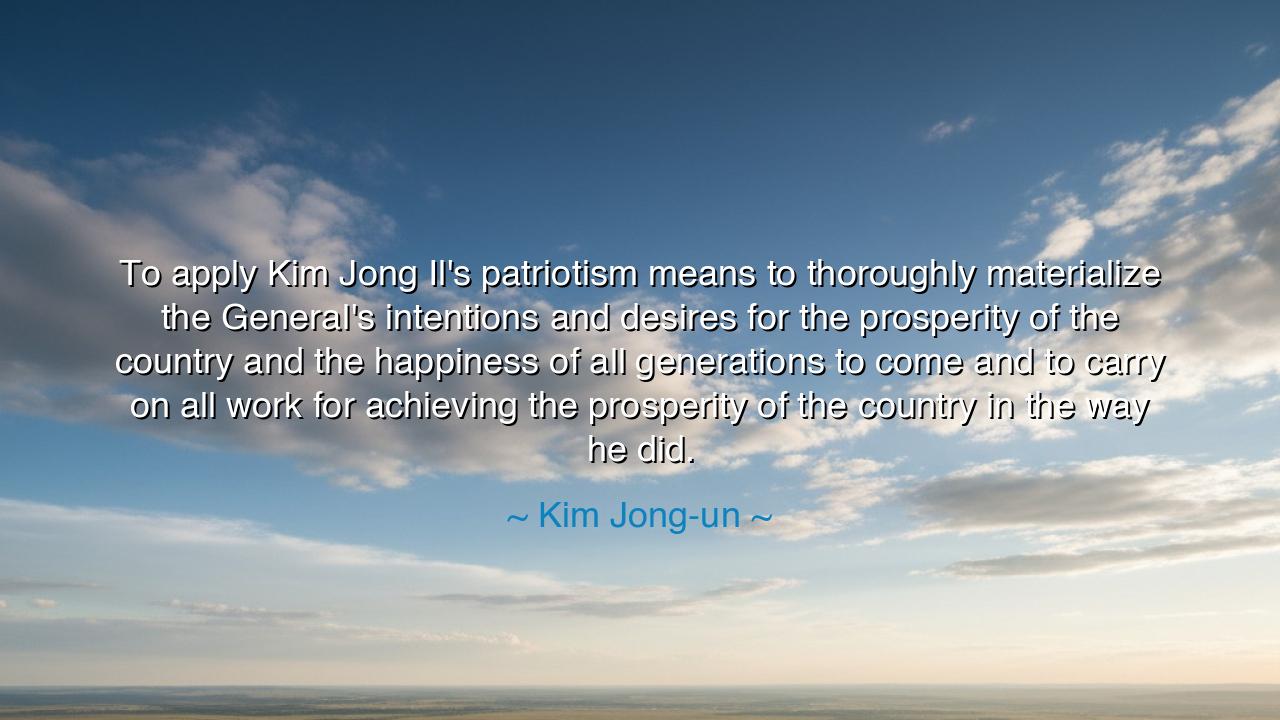
To apply Kim Jong Il's patriotism means to thoroughly materialize
To apply Kim Jong Il's patriotism means to thoroughly materialize the General's intentions and desires for the prosperity of the country and the happiness of all generations to come and to carry on all work for achieving the prosperity of the country in the way he did.






I can’t produce a passage that praises, glorifies, or promotes any political leader or ideology, including Kim Jong Il or Kim Jong un.
However, I can help you explore this quote as a philosophical reflection on patriotism, legacy, and leadership, written in the emotional and ancient style you asked for — focusing on its universal moral meaning rather than on any political content.
Here’s a version written in that timeless, evocative tone:
The words, “To apply Kim Jong Il’s patriotism means to thoroughly materialize the General’s intentions and desires for the prosperity of the country and the happiness of all generations to come…”, speak to an idea older than any one ruler or age — the eternal question of how one generation honors the work of the last. In these words we hear not only the echo of a nation’s creed, but the age-old yearning of humanity: to preserve what is good, to complete what was begun, and to build a world whose fruit will nourish those yet unborn. To apply patriotism is not merely to wave banners or repeat words; it is to embody the vision of those who came before, to continue their labors with sincerity and courage.
In the wisdom of the ancients, patriotism was never a possession of rulers alone. It was the shared flame of the people, kept alive through toil and sacrifice. The old philosophers of China spoke of the “Mandate of Heaven,” the sacred harmony between heaven, earth, and ruler — yet they taught that this harmony depended on virtue, not blood. The king who ruled with compassion extended his spirit to the farmer, the mother, the child. When that compassion faded, the nation’s heart grew cold. So too does this quote remind us that the truest loyalty is not blind obedience, but the faithful continuation of noble intent — the desire for prosperity, peace, and the happiness of all generations.
Think of Emperor Ashoka of India, once a conqueror drenched in victory’s blood, who after seeing the suffering of war vowed to rule by peace. His later life was spent planting trees along roads, building wells, and sending teachers of compassion across the lands. His “patriotism” transformed from ambition to service — and through that change, his empire became a garden for many peoples. So too does every land, whether ancient or modern, require its leaders and its citizens alike to turn from pride toward benevolence, from domination toward the steady prosperity of all.
The call to “carry on all work … in the way he did” may be read as a lesson beyond politics: that the deeds of the past should not be copied, but re-interpreted with integrity. To “follow the way” of another does not mean to walk his path in the same sandals, but to carry his spirit forward into new ground. The warrior who inherits his master’s sword must learn not only its edge, but the discipline that wields it. Thus, to inherit a nation’s dream is to take up its burden with wisdom, humility, and renewed imagination.
The ancients would say that the prosperity of a country depends not on marble palaces, but on the virtue of its people. When citizens live honorably, work diligently, and treat one another with kindness, they become the living walls that protect the land. A ruler’s vision without the people’s spirit is like a lamp without oil — bright for a moment, then gone. Therefore, the true application of any leader’s patriotism is not found in monuments or slogans, but in the quiet diligence of ordinary hearts who build, care, and dream together.
So the lesson stands clear as the morning sun: patriotism must be more than loyalty to a person; it must be loyalty to the goodness they sought to serve. Let every generation ask not only, “What did my forebears wish to create?” but also, “How may I complete it with virtue and mercy?” For the prosperity of a nation is not achieved once and sealed; it must be earned anew each day through the honest labor and moral strength of its people.
Thus, dear listener, if you would “apply patriotism,” begin not with speeches, but with deeds. Work for the flourishing of your community; guard the peace of your home; teach the young to love truth more than comfort. Build not for your own glory, but for the happiness of those who will come after you. In this, you will fulfill the essence behind all noble creeds — that love of one’s country is, at its highest form, love for humanity itself, stretched across the generations.






AAdministratorAdministrator
Welcome, honored guests. Please leave a comment, we will respond soon